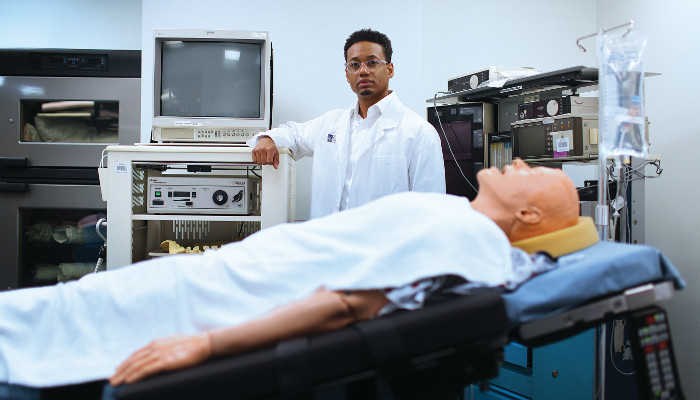LENS Health and Wellness
Easing the End
Questions for Nursing Associate Professor Ron Hickman
 PHOTO: MICHAEL F. McELROY
PHOTO: MICHAEL F. McELROYRon Hickman teaches, mentors, conducts research and works as a critical-care nurse.
Ronald Hickman Jr., PhD, RN (CWR '00; NUR '06, '13; GRS '08, nursing), describes the moment as an "intervention." He was just out of high school in Youngstown and had little interest in college. "I was an inner-city kid, and smarts weren't something you wore as a badge," he said. His father worked in a paint-can factory and had arranged a summer job for him there. One day, Hickman sat in a plant break room, listening to advice from men who had worked in factories their entire adult lives, some missing portions of their fingers from industrial accidents: "Ron, you're too smart for this. If we could get out, we would." That advice got him motivated. Now an associate professor in the Frances Payne Bolton School of Nursing at Case Western Reserve, Hickman has racked up multiple teaching and mentoring awards—and significant research success as well.
Why nursing?
Spring of my senior year, just weeks from graduating with a biology degree, I attended a networking breakfast on campus where we discussed our career paths. I'd considered public health or med school, but really had no plan. Patricia McDonald* [PhD, RN, an assistant professor of nursing] happened to be sitting next to me and asked if I'd ever considered nursing. I hadn't. After the breakfast, she literally put me in the backseat of her car—the passenger seat was filled with books and papers—and drove me to the school of nursing. There, I saw not only what nurses were capable of doing, but the incredible work they do for patients. That's when the bug bit me. You were a nurse first and then decided to teach.
How did that happen?
I began teaching undergraduates to help cover my tuition, which was another moment that helped inform my career direction.
You occasionally meet with students for coffee or dinner. Why?
Mentors had done that with me, and they became more authentic to me. It creates a real rapport and trust. You really get a chance to learn more about your students in a way that a classroom or a lab setting doesn't allow.
Why do you have such a profound interest in end-of-life care as a research focus?
Working as a critical-care nurse has been life-changing. I remember one patient in particular—a woman in her 40s who had received a second liver transplant. She was a relative newlywed whose husband kept vigil by her bedside and remained hopeful and positive, despite the grave prognosis. My goal was to keep her going through the night so more family could be there. She made it through my shift but died the next morning. But I looked at her connected to all these machines and thought to myself: "What are we doing? We're probably causing more harm and distress." I knew I wanted to be involved in making death and dying more sensitive to the needs of patients and their families.
What is a "good" death?
A good death is whatever that family or whatever that patient sees it to be. I don't ever put a definition or my own interpretation on it, although my philosophy—and what I tell students—is you never leave a dying patient alone.
Any advice you'd be comfortable offering someone who's afraid to die?
People are often fearful of dying alone or not being able to mend a fractured relationship. When I think about some of the regrets that most dying people have, it's about relationships. When their family is around them, that fear seems to dissipate.





